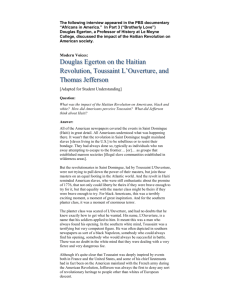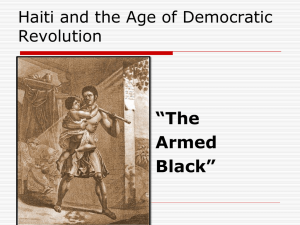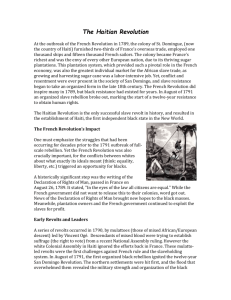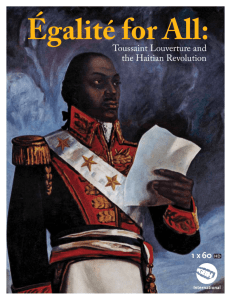The Haitian Revolution – L’Ouverture’s Speeches and Letters 1 The Haitian Revolution
advertisement
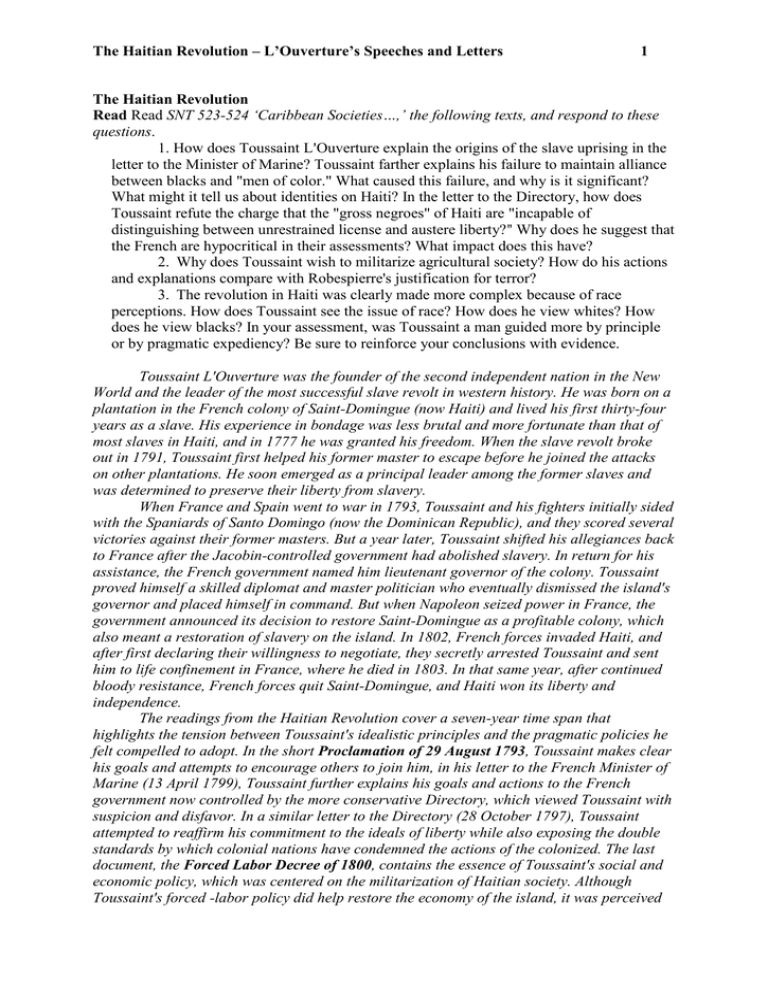
The Haitian Revolution – L’Ouverture’s Speeches and Letters 1 The Haitian Revolution Read Read SNT 523-524 ‘Caribbean Societies…,’ the following texts, and respond to these questions. 1. How does Toussaint L=Ouverture explain the origins of the slave uprising in the letter to the Minister of Marine? Toussaint farther explains his failure to maintain alliance between blacks and "men of color." What caused this failure, and why is it significant? What might it tell us about identities on Haiti? In the letter to the Directory, how does Toussaint refute the charge that the "gross negroes" of Haiti are "incapable of distinguishing between unrestrained license and austere liberty?@ Why does he suggest that the French are hypocritical in their assessments? What impact does this have? 2. Why does Toussaint wish to militarize agricultural society? How do his actions and explanations compare with Robespierre's justification for terror? 3. The revolution in Haiti was clearly made more complex because of race perceptions. How does Toussaint see the issue of race? How does he view whites? How does he view blacks? In your assessment, was Toussaint a man guided more by principle or by pragmatic expediency? Be sure to reinforce your conclusions with evidence. Toussaint L'Ouverture was the founder of the second independent nation in the New World and the leader of the most successful slave revolt in western history. He was born on a plantation in the French colony of Saint-Domingue (now Haiti) and lived his first thirty-four years as a slave. His experience in bondage was less brutal and more fortunate than that of most slaves in Haiti, and in 1777 he was granted his freedom. When the slave revolt broke out in 1791, Toussaint first helped his former master to escape before he joined the attacks on other plantations. He soon emerged as a principal leader among the former slaves and was determined to preserve their liberty from slavery. When France and Spain went to war in 1793, Toussaint and his fighters initially sided with the Spaniards of Santo Domingo (now the Dominican Republic), and they scored several victories against their former masters. But a year later, Toussaint shifted his allegiances back to France after the Jacobin-controlled government had abolished slavery. In return for his assistance, the French government named him lieutenant governor of the colony. Toussaint proved himself a skilled diplomat and master politician who eventually dismissed the island's governor and placed himself in command. But when Napoleon seized power in France, the government announced its decision to restore Saint-Domingue as a profitable colony, which also meant a restoration of slavery on the island. In 1802, French forces invaded Haiti, and after first declaring their willingness to negotiate, they secretly arrested Toussaint and sent him to life confinement in France, where he died in 1803. In that same year, after continued bloody resistance, French forces quit Saint-Domingue, and Haiti won its liberty and independence. The readings from the Haitian Revolution cover a seven-year time span that highlights the tension between Toussaint's idealistic principles and the pragmatic policies he felt compelled to adopt. In the short Proclamation of 29 August 1793, Toussaint makes clear his goals and attempts to encourage others to join him, in his letter to the French Minister of Marine (13 April 1799), Toussaint further explains his goals and actions to the French government now controlled by the more conservative Directory, which viewed Toussaint with suspicion and disfavor. In a similar letter to the Directory (28 October 1797), Toussaint attempted to reaffirm his commitment to the ideals of liberty while also exposing the double standards by which colonial nations have condemned the actions of the colonized. The last document, the Forced Labor Decree of 1800, contains the essence of Toussaint's social and economic policy, which was centered on the militarization of Haitian society. Although Toussaint's forced -labor policy did help restore the economy of the island, it was perceived The Haitian Revolution – L’Ouverture’s Speeches and Letters 2 by many to contradict his stance on liberty, and it significantly weakened his support among the black working classes. Consequently, when French forces invaded in 1802, Toussaint was unable to rally sufficient support, and he was arrested and sent into exile. But although Haitians were unhappy with Toussaint, they were not willing to lose their liberty to the French. Fighting soon resumed, and when the French recognized the futility of their efforts and withdrew their forces, Haiti proclaimed its independence in 1803. SPEECHES AND LETTERS OF TOUSSAINT L=OUVERTURE ON THE HAITIAN REVOLUTION (1793-1800) Proclamation of 29 August 1793 Brothers and Friends: I am Toussaint L'Ouverture. My name is perhaps known to you. I have undertaken to avenge you. I want liberty and equality to reign throughout St. Domingue. I am working toward that end. Come and join me, brothers, and combat by our side for the same cause. Letter to the Minister of Marine, 13 April 1799 The first successes obtained in Europe by the partisans of liberty over the agents of despotism were not slow to ignite the sacred fire of patriotism in the souls of all Frenchmen in St. Domingue. At that time, men's hopes turned to France, whose first steps toward her regeneration promised them a happier future... [The whites in St. Domingue] wanted to escape from their arbitrary government, but they did not intend the revolution to destroy either the prejudices that debased the men of color1 or the slavery of the blacks, whom they held in dependency by the strongest law. In their opinion, the benefits of the French regeneration were only for them. They proved it by their obstinate refusal to allow the people of color to enjoy their political rights and the slaves to enjoy the liberty that they claimed. Thus, while whites were erecting another form of government upon the rubble of despotism, the men of color and the blacks united themselves in order to claim their political existence; the resistance of the former having become stronger, it was necessary for the latter to rise up in order to obtain [political recognition] by force of arms. The whites, fearing that this legitimate resistance would bring general liberty to St. Domingue, sought to separate the men of color from the cause of the blacks in accordance with Machiavelli's principle of divide and rule. Renouncing their claims over the men of color, they accepted the April Decree [1792].2 As they had anticipated, the men of color, many of whom are slave holders, had only been using the blacks to gain on political commands. Fearing the enfranchisement of the blacks, the men of color deserted their comrades in arms, their companions in misfortune, and aligned themselves with the whites to subdue them. Treacherously abandoned, the blacks fought for some time against the reunited whites and the men of color; but, pressed on all sides, losing hope, they accepted the offers of the Spanish king, who, having at that time declared war on France, offered freedom to those blacks of St. Domingue who would join his armies. Indeed, the silence of pre-Republican France on the long-standing claims for their natural rights made by the most interested, the noblest, the most useful portion of the population of St. Domingue... extinguished all glimmer of hope in the hearts of the black slaves and forced them, in spite of themselves, to throw 1 By "men of color" Toussajnt refers to the mulattos, or people of mixed racial ancestry. In Haiti their status and position in society was barely above that of blacks. 2 In the April Decree of 1792, the French Assembly, now dominated by liberals from the business and commercial classes, issued a law that gave full citizenship to people of color but nor to blacks or slaves. Some historians contend that this measure was intended to weaken Toussainr's forces and allow white plantation owners to retake control of the island. The Haitian Revolution – L’Ouverture’s Speeches and Letters 3 themselves into the arms of a protective power that offered the only benefit for which they would fight. More unfortunate than guilty, they turned their arms against their fatherland... Such with the crimes of these blacks, which have earned them to this day the insulting titles of brigands, insurgents, rebels... At that time, I was one of the leaders of these auxiliary troops, and I can say without fear of contradiction that I owed my elevation in these circumstances only to the confidence that I had inspired in my brothers by the virtues for which I am still honored today... Letter to the Directory, 28 October 1797 Second Assertion [made by a critic in the French Assembly]: "Everyone is agreed in portraying the Colony in the most shocking state of disorder and groaning under the military government. And what a military government! In whose hands is it confined? In that of ignorant and gross negroes, incapable of distinguishing between unrestrained license and austere liberty." This shocking disorder in which the Commission3 found St. Domingue was not the consequence of the liberty given to the blacks, but the result of the uprising of thirty Ventose [mulattos]4, for prior to this period, order and harmony reigned in all Republican territory as far as the absence of laws would allow. All citizens blindly obeyed the orders of General Laveaux; his will was the national will for them, and they submitted to him as a man invested with the authority emanating from the generous nation that had shattered their chains. If, upon the arrival of the Commission, St. Domingue groaned under a military government, this power was not in the hands of the blacks; they were subordinate to it, and they only executed the orders of General Laveaux. These were the blacks who, when France was threatened with the loss of this Colony, employed their arms and their weapons to conserve it, to reconquer the greatest part of its territory that treason had handed over to the Spanish and English... These were the blacks who..., flew to the rescue of General Laveaux... and who, by repressing the audacious rebels who wished to destroy the national representation, restored it to its rightful depository. Such was the conduct of those blacks in whose hands,... the military government of St. Domingue found itself, such are those negroes accused of being ignorant and gross; undoubtedly they are, because without education there can only be ignorance and grossness. But must one impute to them the crime of this educational deficiency or, more correctly, accuse those who prevented them by the most atrocious punishments from obtaining it? And are only civilized people capable of distinguishing between good and evil, of having notions of charity and justice? The men of St. Domingue have been deprived of an education; but even so, they no longer remain in a state of nature, and because they haven't arrived at the degree of perfection that education bestows, they do not merit being classed apart from the rest of man kind, being confused with animals... Undoubtedly, one can reproach the inhabitants of St. Domingue, including the blacks, for many faults, even terrible crimes. But even in France, where the limits of sociability are clearly drawn, doesn't one see its inhabitants, in the struggle between despotism and liberty, going to all the excesses for which the blacks are reproached by their enemies? The fury of the two parties has been equal in St. Domingue; and if the excesses of the blacks in these 3 In 1796, a group of civil commissioners arrived from France, instructed by the Directory to ascertain the situation and to begin to reestablish full French authority over the island. By this time, Toussaint had privately come to the conclusion that the liberty of blacks could be guaranteed only under an independent black government. 4 Refers to an attempted coup in 1796 by the mulattos against French Governor Laveaux. The plotters were thwarted by Toussaint and his army, and a grateful (and militarily weak) Governor Laveaux rewarded Toussaint by naming him lieutenant governor. The Haitian Revolution – L’Ouverture’s Speeches and Letters 4 critical moments haven't exceeded those committed in Europe, must not an impartial judge pronounce in favor of the former? Since it is our enemies themselves who present us as ignorant and gross, aren't we more excusable than those who, unlike us, were not deprived of the advantages of education and civilization? Forced Labor Decree, 12 October 1800 Citizens, After putting an end to the war in the South, our first duty has been to return thanks to the Almighty; which we have done with the zeal becoming so great a blessing: Now, Citizens, it is necessary to consecrate all our moments to the prosperity of St. Domingo, to the public tranquility, and consequently, to the welfare of our fellow citizens. But, to attain this end in an effectual manner, all the civil and military officers must make it their business, everyone in their respective department, to perform the duties of their offices with devotion and attachment to the public welfare. You will easily conceive, Citizens, that Agriculture is the support of Government; since it is the foundation of Commerce and Wealth, the source of Arts and Industry, it keeps everybody employed, as being the mechanism of all Trades. And, from the moment that every individual becomes useful, it creates public tranquility; disturbances disappear together with idleness, by which they are commonly generated, and everyone peaceably enjoys the fruits of his industry. Officers civil and military, this is what you must aim at; such is the plan to be adopted, which I prescribe to you; and I declare in the most peremptory manner, that it shall be enforced: My country demands this salutary step; I am bound to it by my office, and the security of our liberties demands it imperiously. But in order to secure our liberties, which are indispensable to our happiness, every individual must be usefully employed, so as to contribute to the public good, and the general tranquility. Considering that the soldier, who has sacred duties to perform, as being the safe guard of the people... is strictly subordinate to his superior officers: It is of great importance that overseers, drivers and field-negroes, who in like manner have their superiors, should conduct themselves as officers... and soldiers in whatever may concern them. Considering that when an officer... or a soldier deviates from his duty he is delivered over to a court-martial to he tried and punished according to the laws of the Re public, for in military service no rank is to be favored when guilty: The overseers, drivers and field-negroes, as subject to constant Labor, and equally subordinate to their superiors, shall be punished in like manner, in case of failure in their respective duties. Whereas a soldier cannot leave his company, his battalion, or half-brigade, and enter into another, without the severest punishment, unless provided with a commission in due form from his Chief; field-negroes are forbidden to quit their respective plantations without a lawful permission. This is by no means attended to, since they change their place of Labor as they please, go to and fro, and pay not the least attention to agriculture, though the only means of furnishing sustenance to the military, their protectors. They even conceal themselves in towns, in villages, and mountains, where... they live by plunder, and in a state of open hostility to society...
